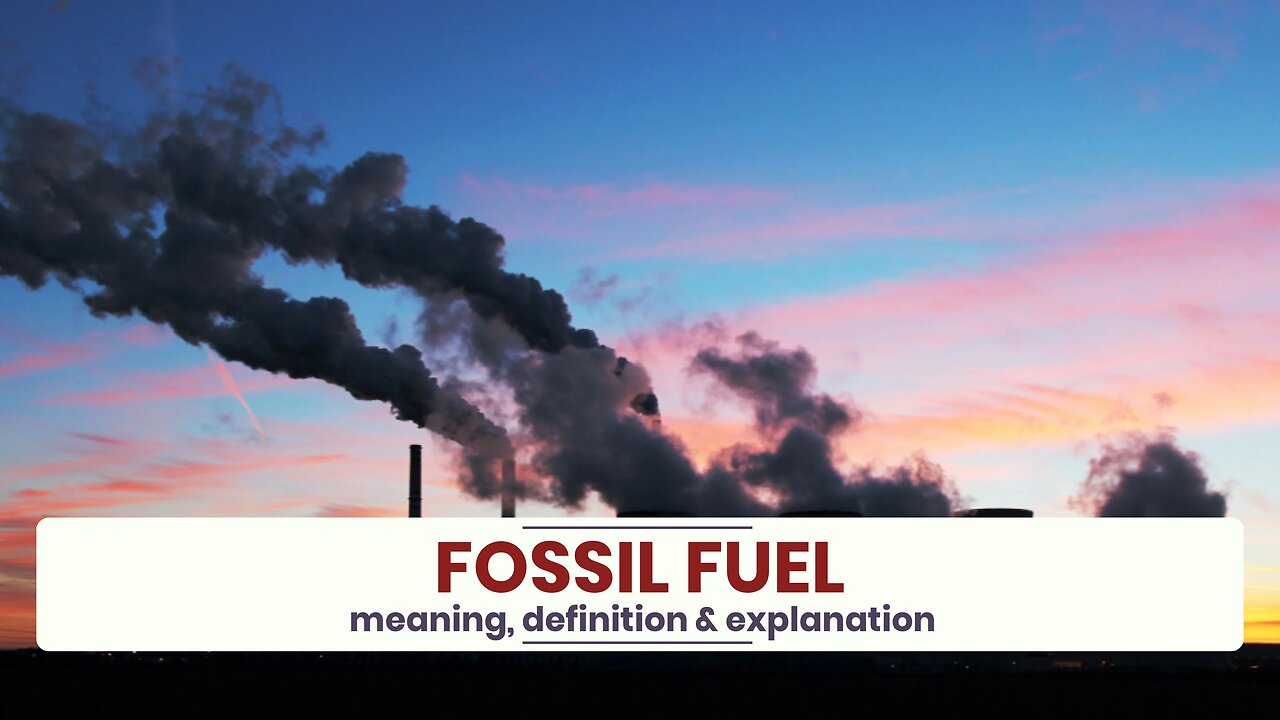Premium Only Content

What is FOSSIL FUEL?
✪✪✪✪✪
http://www.theaudiopedia.com
✪✪✪✪✪
What does FOSSIL FUEL mean? FOSSIL FUEL meaning - FOSSIL FUEL definition - FOSSIL FUEL explanation. What is the meaning of FOSSIL FUEL? What is the definition of FOSSIL FUEL? What does FOSSIL FUEL stand for? What is FOSSIL FUEL meaning? What is FOSSIL FUEL definition?
A fossil fuel is a fuel formed by natural processes, such as anaerobic decomposition of buried dead organisms, containing energy originating in ancient photosynthesis.Such organisms and their resulting fossil fuels typically have an age of millions of years, and sometimes more than 650 million years. Fossil fuels contain high percentages of carbon and include petroleum, coal, and natural gas. Commonly used derivatives of fossil fuels include kerosene and propane. Fossil fuels range from volatile materials with low carbon-to-hydrogen ratios (like methane), to liquids (like petroleum), to nonvolatile materials composed of almost pure carbon, like anthracite coal. Methane can be found in hydrocarbon fields either alone, associated with oil, or in the form of methane clathrates.
The theory that fossil fuels formed from the fossilized remains of dead plants by exposure to heat and pressure in the Earth's crust over millions of years was first introduced by Andreas Libavius "in his 1597 Alchemia [Alchymia]" and later by Mikhail Lomonosov "as early as 1757 and certainly by 1763". The first use of the term "fossil fuel" occurs in the work of the German chemist Caspar Neumann, in English translation in 1759. The Oxford English Dictionary notes that in the phrase "fossil fuel" the adjective "fossil" means obtained by digging; found buried in the earth", which dates to at least 1653 - before the English noun "fossil" came to refer primarily to long-dead organisms in the early 18th century.
In the 2018, the world's primary energy sources consisted of petroleum (34%), coal (27%), natural gas (24%), amounting to an 85% share for fossil fuels in primary energy-consumption in the world. Non-fossil sources included nuclear (4.4%), hydroelectric (6.8%), and other renewables (geothermal, solar, tidal, wind, wood, waste) amounted to 4.0%. According to another source, world renewable energy-consumption was 18% in 2018. When compared with the previous year, world energy-consumption grew at a rate of 2.9%, almost double its 10-year average of 1.5% per year, and the fastest since 2010.
Although natural processes continually form fossil fuels, such fuels are generally classified as non-renewable resources because they take millions of years to form and the known viable reserves are being depleted much faster than new ones are being made.
The use of fossil fuels raises serious environmental concerns. The burning of fossil fuels produces around 21.3 billion tonnes (21.3 gigatonnes) of carbon dioxide (CO2) per year. It is estimated that natural processes can only absorb about half of that amount, so there is a net increase of 10.65 billion tonnes of atmospheric carbon dioxide per year. Carbon dioxide is a greenhouse gas that increases radiative forcing and contributes to global warming along with ocean acidification. A global movement towards the generation of low-carbon renewable energy is underway to help reduce global greenhouse-gas emissions.
-
 2:24
2:24
The Audiopedia
9 months agoWhat is AUSTERITY?
79 -
 LIVE
LIVE
Game On!
10 hours agoGrassGuy is EXCITED for Tom Brady's RETURN as Raiders QB1! April Fools'!
10,608 watching -
 34:50
34:50
The Rad Factory
20 hours ago $3.44 earnedCan We Fix Everything Wrong With My Fake F1 Car??
13.9K7 -
 19:53
19:53
CatfishedOnline
10 hours agoMan Dates Jennifer Aniston Or Online Romance Scam?
13.5K12 -
 11:40
11:40
Shea Whitney
14 hours ago $2.05 earned20 Best *DESIGNER INSPIRED* Items on Amazon!
11K4 -
 11:05
11:05
Hannah Barron
21 hours agoFirst STEELHEAD Trip!
18.2K9 -
 1:00:13
1:00:13
Trumpet Daily
20 hours ago $4.75 earnedThe World Realigns Against America - Trumpet Daily | Mar. 31, 2025
13.5K14 -
 11:08
11:08
This Southern Girl Can
12 hours agoDIY Spring Wreath
18.8K3 -
 3:04:40
3:04:40
Danny Polishchuk
18 hours agoLiberation Day Looms + Guest Richard Syrett Talks JFK Files | Low Value Mail Live Call In Show
60.7K23 -
 2:40:15
2:40:15
Barry Cunningham
11 hours agoPRESIDENT TRUMP SIGNS NEW EXECUTIVE ORDERS AND THE EVENING NEWS!
59.8K58